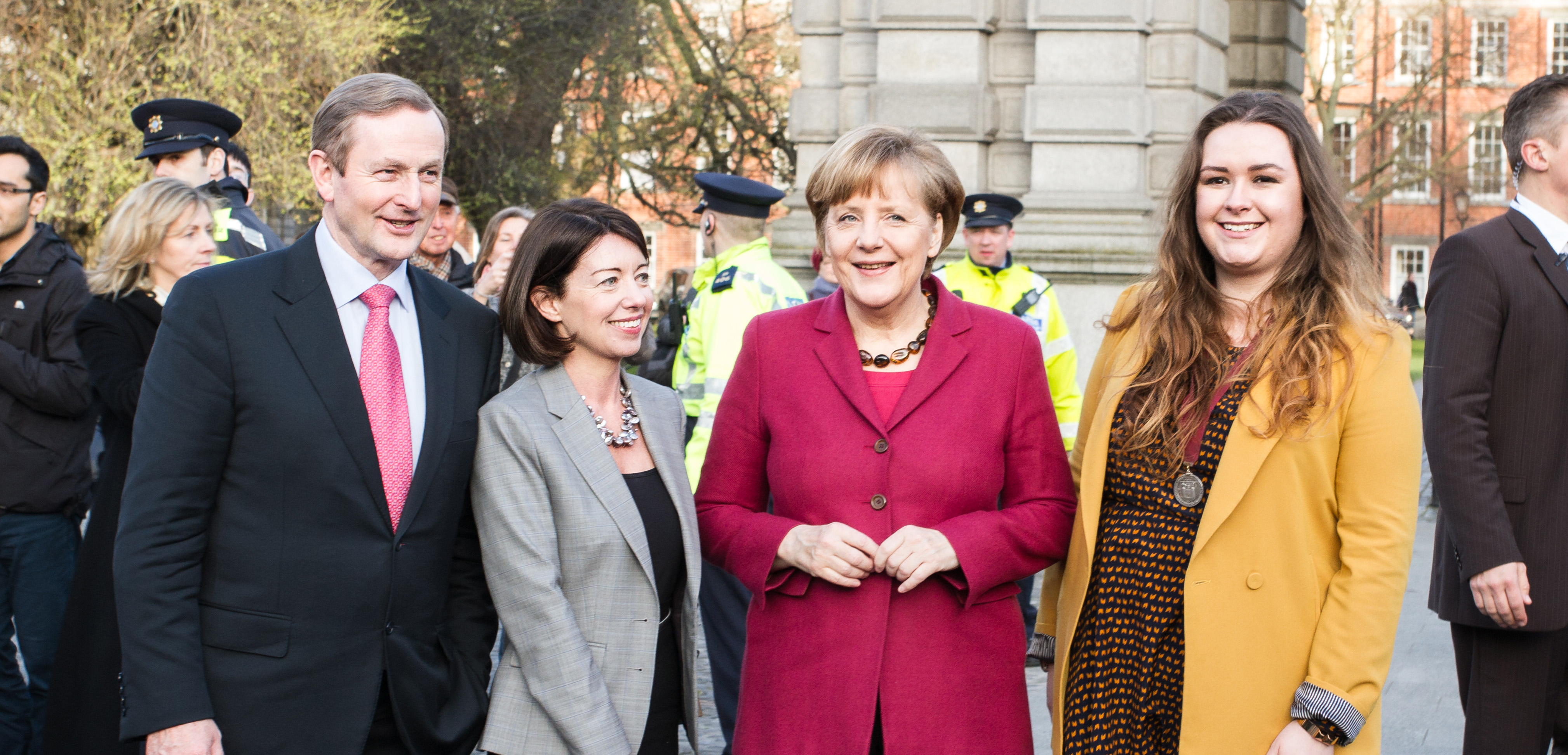James Wilson
Staff Writer
- Chancellor champions EU project, claims to have “every respect” for Ireland’s trials
- Taoiseach accompanies German delegation, says he wants to “listen to young minds”
Protesting members of the Trinity Socialist Worker Student Party (SWSS) were moved away from the entrance of the Graduates’ Memorial Building (GMB) by campus security in time for the arrival of German Chancellor Angela Merkel and Enda Kenny at the yearly inaugural event of the University Philosophical Society (The Phil) on Friday. The two European heads of government arrived with a heavy Garda escort late in the afternoon having attending the centre-right European People’s Party Congress at the Dublin Convention Centre earlier that afternoon.
Opening the carefully choreographed event, Vice-Provost Linda Hogan praised Ireland’s deep and historic links with Germany, saying that Trinity’s Chair in German dated back to 1776 and was thought be the oldest in the world. Following the Vice-Provost was An Taoiseach who prefaced his remarks with what seemed like a gentle dig at the Chancellor by repeatedly emphasising the Gaelic name of Phil President Rosalind Ní Shúilleabháin in response to Merkel’s earlier refusal to try her hand at a cúpla focail at a press conference that day.
Kenny continued by paying a fulsome tribute to Germany as the “power house of economic development, not just in Europe but on the world stage.” He went on to stress his desire to “listen to young minds”, which he insisted were “the most important in the world.” In a brief speech delivered in German, but translated into English for audience members, Chancellor Merkel sought to underline the benefits that the EU has brought to the continent over the recent decades. “Europe,” she insisted, “holds a threefold promise; freedom, peace and prosperity.” Turning to the economy, she voiced her concern that Europe was losing its competitive edge in manufacturing to the United States and emerging markets in Asia, before emphasising the benefits that European integration had bought the continent in terms of trade and human rights. She finished by touching upon Ireland’s economic crisis and congratulated the Irish people on surviving the tough times of the past few years, claiming that she has “every respect for [Ireland] and the trials you have been through.”
A question and answer session followed, moderated by Rosalind Ní Shúilleabháin, in which audience members raised a diverse number of issues. In response to a question of the rise of eurosceptiscism in Europe, Merkel admitted that, “People turn inwards… but I must say I am optimistic [about the European project] and I will always stand up for Europe.” EU membership guarantees freedom of the press, travel and movement, she stressed. When pressed further upon how she managed to balance Germany’s national interest with the interest of individual European nations, she said that the decision making process in Europe was becoming “more and more democratised.”
Merkel also used the opportunity to give advice to women in the audience. She told a female audience member that there were “zero reasons [for] not being confident that you [as a woman] can make it in the same way as a man” and that “a man who has been sitting for 40 years behind a desk may not be a successful as a woman who has children and then goes back to her professional life.”
Additional questioning, this time on the subject of NSA hacking of her mobile phone revealed a lighter side to the Chancellor as she joked that she could not imagine how her phone could be “the focus of much interest”, before adding that she wanted to see “strong protection of our personal and private life” on a European level.
Kenny interjected that excessive surveillance of the citizenry was like his neighbour back in Mayo who used to listen in to people’s telephone conversations back when faulty technology meant the easy interception of personal calls. “Put your phone down, Mary,” was his suggestion.
On the vexing issue of the Ukrainian crisis, Merkel told a Polish questioner, “I don’t think we need to be fearful in the sense of war and peace” before casting doubt of the legitimacy of the “so-called referendum” in Crimea. The final question of the session related to the Chancellor’s favourite book. After a short pause, the Chancellor – the daughter of an East German Lutheran minister – said that it was the Bible, adding that “Reading has influenced my life considerably… For me it’s very nice to get lost in books… in a different world, not to get lost in the day-to-day of politics.”






